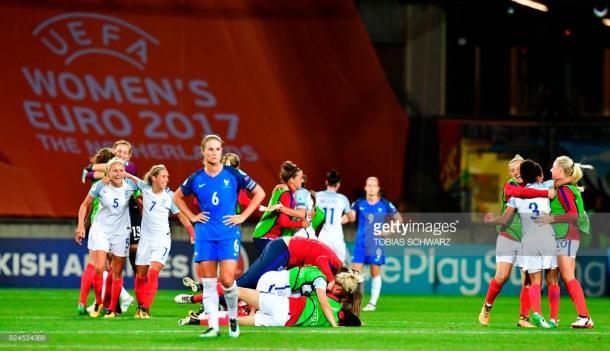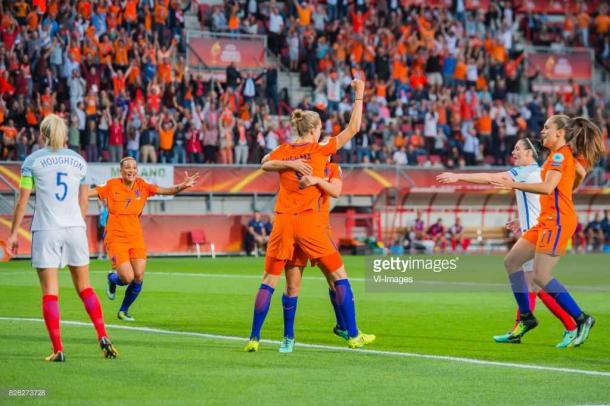Throughout the tournament I was quick to defend managers who’d underperformed with their teams but given that few (outside of the UK) expected England reach the last four were the Lionesses a side who were equally as subpar?
Problems at home
The rush of blood and feel-good bronze at the 2015 World Cup in Canada left the home fans hungry for more from their beloved Lionesses, the fans forced to wait two years for the next major tournament, discontented at the lack of Team GB at the Rio Olympics.
With a home league that’s pushing to be more competitive and one of the best in Europe, the outside appearance is that the WSL has the ability to lure players in for a better wage, the football played elsewhere on the continent still of a higher quality. It’s no surprise to see the foreign imports doing so well in England, the women already of a high calibre shining brightly against English players that far too often are one-note. It’s not a case that it’s women’s football but rather English football, route one still painfully open for a nation that lacks key technical and tactical skills when it comes to the beautiful game. The case for more work at the grassroots level still open.
But even so, there are good, even world class players in the England team, maybe just two who could be considered the best (or one of the best) in their position in the world. But the rest of the squad is beyond competent, Mark Sampson’s “faster, fitter...” moto would also suggest that when it comes to lasting a long 90 minutes at a lengthy tournament, the Lionesses would be the ones left roaring at full-time. And whilst a semi-final loss to the hosts and eventual winners looks – on the surface – to be a strong result, was it really?

Road to the last four
England were the only team of the four semi-finalists who had reached the final before and not too long ago in their history, in 2009 under former manager, Hope Powell. The memories of a complete dismantling by a relentless Germany team still all too fresh in the minds of fans from eight years ago.
Using the Spring Series as a warm-up, the team of 23 long-since announced, the squad should have looked bright and alert, well prepared for the rigors of the tournament. An opening 6-0 win over Scotland left most overjoyed, the Scots not just well below the pale but almost not-existent, their minds left back home, the occasion and psychological blow of missing too many key players too much for England's northern neighbours. England clinical but the game still sagged into lulls throughout – remove the goals and was the game really all that?
A bizarre 2-0 over a Spain side that knew how to possess the ball but not what to do with it followed, La Roja left stunned after two early goals then what? The most ludicrous stats that would suggest a Spain win but no, England defended doggedly in the downpour, top spot all but confirmed, Spain looking less and less like any sort of a team.
From naming his squad months before the start of the competition to changing ten of his starting XI against Portugal – you feel that Millie Bright only kept her spot because Casey Stoney was injured – Sampson’s arrogance reared its ugly head again.
The move unprecedented, was he resting his players? Those who were supposed to be the fittest of the 16 teams? The move saw England loose some momentum, the gamble almost not paying off, Portugal agonisingly close to a draw that would have seen them progress to the knock-outs. The team not one to be disrespected with the idea of facing England B, an absentminded howler from Patricia Morais gifted England the opener but there was nothing too convincing about the team who were up against the lowest ranked side in the tournament (ranked #38 in the World by FIFA at the start of the tournament).
Getting closer and closer to beating France, the stage was set for England in the quarter-finals, a long-awaited win over Les Bleues. Oh, how sweet it was for England, a finger raised at our Franco cousins. But again, was it all that? The French side had been poor, well below anything much, the team only just scrapping through the group stage themselves, without centre-back, Wendie Renard the team lost so much in both boxes. But that was that, a win, oh what a win over France, a spot in the last four confirmed and surely England were best poised to lift the trophy?

A hug shared between Sampson and Olivier Echouafni at the whistle to show no hard feelings over the nonsense quotes about the Frenchman being “wet behind the ears”, a win no easy thing to come by for England against any France team, Sampson’s words drawing aspersions.
So, it was a trip to Enschede after all, De Grolsch Veste packed to the rafters with orange, the noise levels intense but warming, the football from the Lionesses, the highest ranked team left in the tournament, the fittest, the fastest, the most experienced. The football from the visitors woeful, predictable, the personnel wrong, decision making as bad as it had been all tournament. Another semi-final exit, the winners the eventual champions.
Over-achieving?
But for all Sampson had, for all the training and conditioning, all the sport science, the obscene money put into the programme in England, was it enough? England had arguably done more with less two years prior. Walking into the tournament with their chests puffed out, riding high on the term of “best in Europe” after being the best placed European team in Canada could some humility have helped?
The squad is (in this reporter’s opinion) not the best in Europe, the players lack vital dimensions and depth, a life-time spent playing in one league not enough for any real development. But as Austria, Portugal, Italy et all showed, you don’t have to be the best to beat the best, you can still come together as a team and win hearts as you shock the competition.
Despite the wins there was little good football shown from England, that familiar reversion to the long-ball a bane of the game. Where other teams had flare, England lacked, where they had technical skills to get the ball down and play, England lacked. A joke about the number of Dutch players who play in WSL made, “Thank you to the English FA for organising the Spring Series and getting the Oranje ready for the tournament” The football for the hosts typically Dutch, players masters of creating space for one another, players who had spells in Sweden, Norway, Germany and France enough to add depth and help their own individual skills.

Disjointed
But English women’s football is just like the men’s, stuck in the past, the national side having peaked in ’66. The mistakes of the Three Lions reflected when the Lionesses take to the pitch but there are unquestionably things that can help the team. So whilst elsewhere I have defended coaches, I am taking a different tack, this time suggesting a change at the top would benefit those on the pitch. A clear lack of Plan B was clear for all to see in the semi-final, but how can a coach, any coach, go into one of the biggest games in his career with no back-up plan, to ignore all the obvious issues with the team he’s fielding? Where does the buck stop?
For those who watch the WSL they know all too well about the capabilities of the individual players, those who shine so brightly for their club teams. Those who come to the England camp and look like a shadow of themselves, their league sparkle left behind. Players who play week in, week out in WSL for the same team, who have a great understanding – how can those same players look so lost together with the England badge on their chests, like strangers thrown together for the first time that morning.
At the La Manga training camp in January I voiced my concerns to one of the handful of English journalists who’d made the trip. The response I received was, “If England are successful, it doesn’t matter how good or bad the football is, no one will complain.” The comment sat with me, because it’s bang on the nose. A team can play the absolute worst football but if they can find wins or ways to progress, the home fans will never care, all they’ll see is the progression in the tournament, the silverware at the end of it. But playing so blindly, not questioning the sub-par performances is a recipe for disaster. Whilst the football England played in the Netherlands might have been their best since the World Cup – or even including it – it still wasn’t as good as it could have been, the mistakes there for all to see.
If insanity is truly doing the same thing time after time and expecting different results, then we’re all crazy.








































